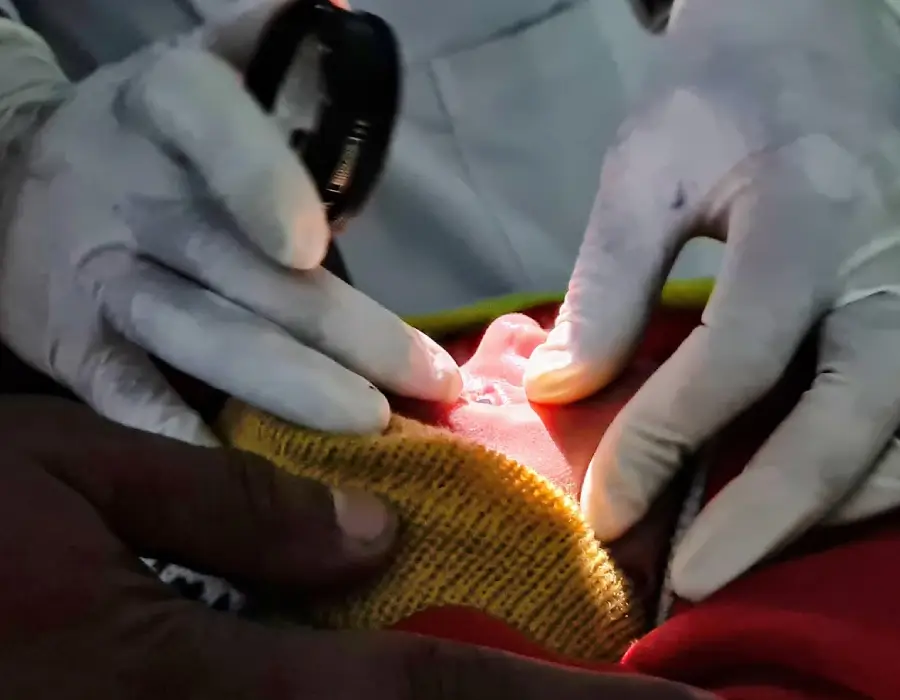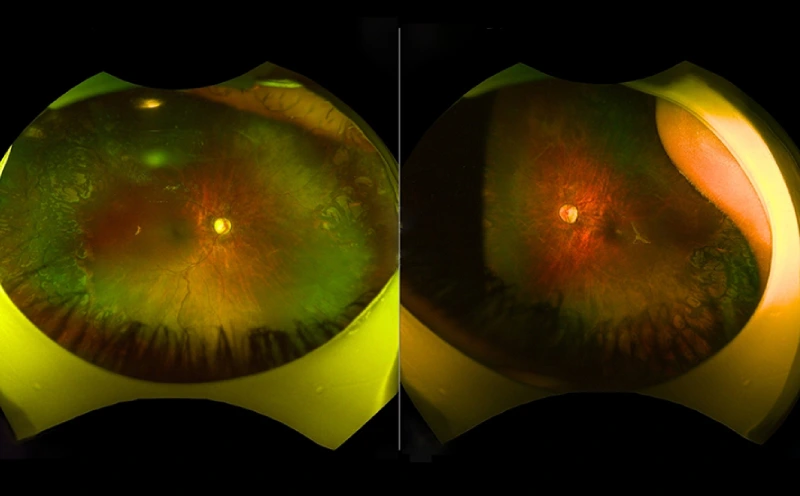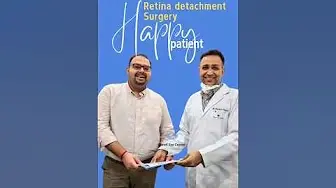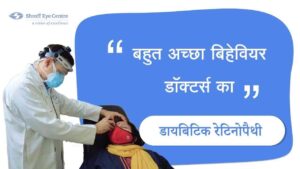As a family from Dehradun, we had the privilege of experiencing exceptional care at Shroff Eye Centre ,Kailash colony ,Delhi for my 69-year-old mother's advanced Vitreo-Retinal(macular hole) surgery.
I'm overwhelmed with gratitude for the outstanding treatment she received.
Dr. Darius's expertise shines through in every aspect of his work, and his impressive qualifications, including being a Fellow of the Royal College of Surgeons, highlight his commitment to upholding the highest standards in surgery.
From the moment we stepped into the centre, the staff's professionalism and kindness impressed us. The liftman, nurses, reception counselors, and anesthetists were all courteous and efficient.
Dr. Darius's skill, experience, and compassion gave us immense confidence throughout the surgery process. His team worked seamlessly together to ensure my mother's comfort and safety.
The centre's integrated computer system is also noteworthy, ensuring that all patient information is readily available and no detail is missed. This level of organisation and optimal use of technology clearly contributes to the high standard of care provided.
Although we had to travel far for the surgery, it was worth every bit.
I wholeheartedly recommend Shroff Eye Centre and Dr. Darius to anyone seeking world-class eye treatment.
Their commitment to delivering exceptional patient care is truly commendable."
I give : 5/5 stars to Shroff eye centre
Your Eyes, Our Passion

Retinopathy of Prematurity (ROP)- Risk factors, Screening & Treatment in Delhi NCR

Overview
Retinopathy of prematurity (ROP) is an eye problem which can cause blindness and is caused due to growth of abnormal blood vessels in the retina of premature or very low birth weight babies. Many babies don't require any intervention but some may require laser treatment or surgery to prevent permanent vision loss. Screening of at risk babies is essential.
Content
What is Retinopathy of prematurity (ROP)?
ROP is a condition of the retina which is seen in some babies born prematurely or who have low birth weight or have some other risk factors. ROP occurs when abnormal blood vessels grow in the baby's retina. The retina is the light sensitive layer at the back of the eye which sends signals to the brain and helps us see.
Some babies with mild ROP don’t require any treatment except monitoring of the blood vessels with a checkup from a retina specialist. But in some babies, intervention may be needed to prevent permanent loss of vision.
How does ROP affect my baby?
Retinopathy of prematurity (ROP) resolves on its own in most babies- however you cannot make out externally if a baby has ROP or not. Externally, the eye will appear normal. Your baby's vision may be as expected initially. Vision gets affected once the ROP progresses. The trouble is, no one can predict which babies will do well and which will develop eye problems, especially without a retina checkup. At risk children must have their retina screened and ROP treated in time to prevent vision loss.
How common is ROP in India?
ROP is becoming a leading cause of preventable blindness in children in India. Around 22-52% of low birth weight babies are affected by ROP in India.(3)
Unfortunately, there is no national data on the incidence of ROP in India and we can only rely on indirect estimates. We quote from the Project Operation Guidelines for prevention of Retinopathy of Prematurity (ROP): “There are about 3.5 million premature births in India. Of these around one in six (i.e. 600,000) children are born at <32 weeks gestational age. Assuming that about 40% of these receive neonatal care and 80% of them survive, about 192,000 children are at risk of developing ROP in India every year. If about 5-10% of them develop treatable ROP, the number of newborns needing ROP management is at least 10,000-20,000 every year. In addition, children with GA 32–36 weeks who receive suboptimal postnatal care and have comorbidities may also be at the risk of developing ROP.”
Risk Factors & Prevention
What are risk factors for Retinopathy of Prematurity (ROP)?
The main risk factors for ROP include
- Premature birth: babies born before 31 weeks are at higher risk. The more premature the baby, the higher the risk of developing ROP. In India, babies under 34 weeks are considered at risk.
- Low Birth Weight: Babies who weigh less than 1500 grams at birth at a higher risk of ROP. In India, children under 2000 grams are considered at risk.
- Those who require prolonged oxygen support after birth
- Babies with Cardiopulmonary problems or respiratory distress
- Babies who received blood transfusion or exchange transfusion
- Babies who have sepsis (severe infection)
- Babies with interventricular hemorrhage
- Babies with apnea or breathing problems
- Babies with poor post-natal weight gain
- Babies who were admitted in NICU and deemed at risk by neonatologist
When should a newborn be screened for ROP?
According to Indian guidelines, all babies at risk of ROP should be screened before they are 30 days old. Babies at high risk (<1200 grams and <30 weeks) may be screened earlier at age 2-3 weeks. The time interval for follow-up screenings depends on the stage of disease.
How can I protect my baby from ROP?
The easiest way to protect your baby from ROP is to make sure that if your baby is preterm , low birth weight or has any of the risk factors listed above, they are seen by a retina specialist within 30 days, or earlier, of birth.
In many babies ROP gets better on its own. But in some babies, it can progress rapidly. As we cannot predict in which baby ROP will suddenly worsen, it needs to be monitored regularly. This means you may have to visit the retina specialist more than once. This helps to keep a track of ROP progression and can be urgently treated if it progresses.
Symptoms & Causes
What are the signs & symptoms of Retinopathy of Prematurity (ROP)?
There are no definite symptoms and signs of Retinopathy of Prematurity. In advanced cases of ROP, the baby may develop retinal detachment and/ or vision loss and blindness.
If ROP damaged your baby’s eye, You may note these later
- Baby doesn’t follow light or objects
- Baby does not recognize or respond to faces
- Their eyes shake or make abnormal movements
My baby’s eyes look normal, do they have ROP?
When ROP develops, your baby will not feel pain or look any different to you. ROP does not have any external physical manifestation- it's the growth of abnormal blood vessels on the retina- a structure located inside the eye at the back of the eye. This is why a retina specialist must screen all at-risk babies by dilating their pupils and using an indirect ophthalmoscope to visualise the back of their eye.
What causes ROP?
The normal development of retinal blood vessels is disrupted in ROP or Retinopathy of prematurity. The retina is important for seeing or our vision and requires proper blood supply to function well.
Normally, blood vessels develop throughout the pregnancy but are fully mature by term i.e. 36-40 weeks of gestation. When a baby is born early, these blood vessels are immature and stop developing normally. They may bleed or grow rapidly in the wrong direction and this causes vision problems.
The vessels may pull on the retina, to which they are also attached, causing the retina to move from its normal position (retinal detachment).
Diagnosis
How is retinopathy of prematurity diagnosed?
Retinopathy of prematurity (ROP) is diagnosed by a retina specialist by doing a dilated eye checkup for the baby.
Eye drops are put into the baby’s eyes to dilate their pupil (the central black part of the eye). The retina specialist then uses a special device called indirect ophthalmoscope to look at the back of the eye or the retina.
The eye specialist then identifies the disease according to the International Classification of ROP (ICROP) for classifying ROP. The dilated examination may need to be done more than once depending upon the severity of ROP.
Are there any other tests for diagnosing ROP?
A dilated retina checkup is usually required. But the specialists may also ask for imaging of the baby’s retina- such as a wide field color photograph of the back of the eye to visualise the retina. In places where a specialist is not available, a wide field retina image may be done by trained special operators as the first screening step.
What is Staging of ROP?
Stages of International Classification of ROP (ICROP) are used for classifying Retinopathy of Prematurity (ROP) on the basis of location, severity, extent and the nature of abnormal blood vessels. This is done to monitor the ROP and decide on the course of treatment.

Treatment & Management
How is retinopathy of prematurity (ROP) treated?
Many babies with ROP get better without any intervention- they just need monitoring. But in some babies, ROP may progress rapidly. There is a very small window for effective management of ROP which preserves vision- which is why both correct staging and early treatment are important. The main treatment options for ROP are
- Laser Photocoagulation: This is the gold standard for treating ROP without retinal detachment.
- Anti-VEGF injections: These medicines are injected into the eye and help in stopping the abnormal growth of blood vessels. The doctor may choose to use injections as an alternative or in addition to the laser treatment.
- Retina Surgery: If there is a retina detachment, vitreo-retinal surgery may be required. It is usually indicated in stage 4/ 5 of ROP. Scleral buckling and/ or vitrectomy may be required. Despite these retina surgeries, the baby’s vision may not recover when the ROP is this advanced. This is why early screening and treatment are essential. Read about treatment of retinal detachment here
- Cryotherapy: This is usually not used nowadays except in cases where laser treatment is not available or laser cannot be done. Cryotherapy uses a very low temperature probe to stop the proliferation of blood vessels.
What is the goal of ROP Treatment?
The goal of ROP treatment is to keep ROP from getting worse and prevent blindness. However some babies, especially those with advanced ROP, may still have vision loss or blindness despite treatment.
How long is the follow up after ROP treatment?
Follow up depends upon stage and severity of ROP and on what treatment is done. It’s also possible for babies in any stage to get worse quickly and need urgent treatment. That’s why it’s important that your baby is checked by their retina specialist during follow-up exams on schedule.
Follow up within a week of laser treatment, Anti VEGF injections and surgery is usually required. Subsequent follow ups depend on the response to treatment.
Once the child grows up, they will need regular eye checkups as those with ROP are at a higher risk of amblyopia, myopia, and squint.
Please check with your baby’s retina specialist how often your baby needs to get an eye checkup.
Prognosis
What are the complications of ROP?
Untreated cases of ROP may progress to a point where the retina moves from its normal position. This is called retina detachment and can cause blindness or partial vision loss.
Children who had ROP when younger, and underwent successful treatment, are still at a higher risk of developing
- Myopia (Nearsightedness)
- Amblyopia (lazy eye)
- Squint (crossed eyes)
What is the prognosis for a child with ROP?
Prognosis depends on the stage of ROP, when treatment is started and other risk factors and conditions the baby may have. Without treatment or if ROP is in its later stages and retina detachment has occurred, the visual outcome becomes guarded.
Untreated retina detachment has poor visual prognosis.
FAQs
Will ROP get better on its own?
In some babies it does not need treatment and improves on its own. But in some babies it will progress and can cause blindness if untreated. We cannot predict in which babies ROP will progress and when it will not. This is why early screening and intervention are required of all at-risk children.
Why is it important to treat ROP?
As medical care improves, the survival rate of preterm and low birth weight infants has improved. Preterm infants and those with low birth weight are at risk of ROP, which can cause blindness and is preventable with proper care.
All babies born preterm, low birth weight and other risk factors (see above) must be seen by a retina specialist within 30 days of birth. Babies diagnosed with ROP need regular monitoring by a retina specialist to assess retinal blood vessel development, ensure appropriate treatment and prevent vision loss.
Any new research in ROP?
Yes, research is on going to understand the exact mechanism driving ROP development, on ventilation methods for babies and newer medicines which may help in ROP.
Is treatment for ROP available at Shroff Eye Centre?
Yes, treatment for ROP is available at Shroff Eye Centre. Our retina team is one of the best in the country and handles all kinds of cases regularly. With the latest wide-field imaging and the advanced equipment, we provide the best retina care in India.
Retina Patient Testimonials
See the Difference
Why Shroff Eye Centre?
1
Excellence
in Eyecare since 1914
2
Award winning
Eye specialists
3
Empathetic
Personalised patient care
4
Advanced care
1 lac happy eyes / year
5
Ethical
Patient-first approach
Patient Reviews
Great experience from the reception till departure. Dr. Cyrus is a great clinician and retina expert, thorough and reassuring. Indeed an authority in the subject. Thanks.
I had an excellent experience with Dr. Gagan Bhatia retina specialist. From the moment I walked in, the staff was warm and professional. Dr. Gagan Bhatia took the time to explain my condition in detail, answered all my questions patiently, and made sure I felt at ease throughout the process. The treatment was smooth, and I noticed a clear improvement in my vision. I highly recommend anyone with retina issues to visit them — truly an expert in the field.
I had a wonderful experience with Dr. Gagan Bhatia. He is not only highly skilled but also extremely patient and understanding. He took the time to explain my condition in detail, answered all my questions, and made me feel completely at ease throughout the treatment process. His expertise as a retina specialist is evident, and I felt confident and well cared for at every step. The staff was also very supportive, and the clinic was well-organized. I truly appreciate his professionalism and compassion and would highly recommend Dr. Gagan Bhatia to anyone seeking expert eye care.
I had a retina surgery and developed a glaucoma and then cataract , as with the young age it’s too dark time to go thru , but then some how I got a reference of DR. JASLEEN from Dr.Shroff centre kaushambi and got operated cataract on one of my eye . I should address here , that she is such a great expertise ,to me as a patient she was so polite to attend calls whenever I call her due to sudden phobia of eye treatments . Dr .jasleeen is most amazing and wonderful doctor . Still my routine check up is continuing with her . She is such a sweet as a person and as professional . And yes outcome of surgery is amazing and superb .
ROP Treatment Near You
Kailash Colony
A-9, Lala Lajpat Rai Rd, Block A, Kailash Colony, Greater Kailash, New Delhi, Delhi 110048
South Delhi areas- Greater kailash, Lajpat nagar, Cr park, Defence colony, Niti bagh, Saket, Noida
GET DIRECTIONS
Connaught Place
Building (1st floor, 105, Surya Kiran, 19, KG Marg, New Delhi, Delhi 110001
Central Delhi- serving Karol bagh, Rajender Nagar, Civil lines
GET DIRECTIONS
Gurgaon
110 Bestech Chambers Radisson Suites, Block B, Sector 27, Gurugram, Haryana 122009
Haryana- Golf course road, Cyber city, Rewari, Sohna, Faridabad
GET DIRECTIONS
Ghaziabad
509, KM Trade Tower, adjacent to Radisson Blu, Sector 14, Kaushambi, Ghaziabad, Uttar Pradesh 201010
GET DIRECTIONS
Uttar Pradesh- Greater Noida, Ghaziabad, Merut, Bulandshahr, Hapur
References
- Shukla R, Murthy GVS, Gilbert C, Vidyadhar B, Mukpalkar S. Operational guidelines for ROP in India: A summary. Indian J Ophthalmol. 2020 Feb;68(Suppl 1):S108-S114. doi: 10.4103/ijo.IJO_1827_19. PMID: 31937744; PMCID: PMC7001189.
- Project operational guidelines. Prevention of Blindness from Retinopathy of Prematurity in Neonatal Care Units. Available from: https://phfi.org/wp-content/uploads/2019/05/2018-ROP-operational-guidelines.pdf
- Dogra MR, Katoch D, Dogra M. An Update on Retinopathy of Prematurity (ROP). Indian J Pediatr. 2017 Dec;84(12):930-936. doi: 10.1007/s12098-017-2404-3. Epub 2017 Jul 4. PMID: 28674824.
- Jalali S, Anand R, Kumar H, Dogra MR, Azad R, Gopal L. Programme planning and screening strategy in retinopathy of prematurity. Indian J Ophthalmol. 2003;51:89–97.
- Kaur K, Mikes BA. Retinopathy of Prematurity. [Updated 2025 Jun 2]. In: StatPearls [Internet]. Treasure Island (FL): StatPearls Publishing; 2025 Jan-. Available from: https://www.ncbi.nlm.nih.gov/books/NBK562319/
- Written by Dr. Gagan Bhatia
Retina specialist, Shroff Eye Centre Delhi
Updated: October 2025
Disclaimer
This is not medical advice. Your ophthalmologist will help you decide which procedure and lens is best suited for your eyes. Every patient and eye is different and thus the experience for every patient is variable.
All product and company names are trademarks or registered trademarks of their respective holders. Use of them does not imply any affiliation or endorsement by them.

By being on the website, your personal data is being processed for communication with you and providing services. We use cookies to collect and analyse information on site performance, usage, enhancement of customer usability and improvising the website. We have put in place terms of use,
By clicking on accept you agree to all the policies mentioned above. You can read more about them by clicking on read more and accept them individually.






 Call us
Call us Email us
Email us







